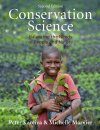About this book
Now is the time for conservation science – a mission-oriented scientific enterprise that seeks to protect nature, including Earth's animals, plants, and ecosystems, in the face of unprecedented human demands upon the planet. Conservation scientists apply principles from ecology, population genetics, economics, political science, and other natural and social sciences to manage and preserve nature. The focus of Conservation Science is first and foremost on protecting nature and especially Earth's biota. It also contains a heavy emphasis on highlighting strategies to better connect the practice of conservation with the needs and priorities of a growing human population.
Now used at over 150 colleges and universities, Conservation Science is an original and modern approach to conservation. Gretchen Daily (Stanford University) says it well: "Based on unparalleled, firsthand experience, Kareiva and Marvier explore the innovative approaches to conservation being honed around the world today. Their account is rigorous and engaging, with fresh questions, data, and quantitative analysis interwoven with vivid stories of actual conservation practice in the field."
Conservation Science was primarily written primarily for undergraduates and beginning graduate students who are interested either in academic careers or working in conservation at government agencies, non-governmental organizations, or international institutions.
Contents
Part I. Why Conservation is Needed
1. Humans Are the Dominant Ecological Force
2. Biodiversity and Extinction
3. Ecosystem Services: Accounting for Nature's Value
Part II. Policy, Protected Areas, and Planning
4. Policy Responses to Biodiversity Loss and Ecosystem Degradation
5. Protected Areas: A Cornerstone of Conservation
6. Conservation Planning and Priorities
Part III. How Science Informs Conservation Strategies
7. The Perils of Small Populations
8. Population Size, Trend, and Viability
9. Assessing Threats and Choosing Conservation Actions
10. Islands of Nature and the Role of Dispersal
11. Restoration and Reintroduction: Measures of Last Resort
12. Adaptive Management and Evidence-Based Conservation
Part IV. Conservation Challenges in a World Shaped by Humans
13. Reversing Global Deforestation and Forest Degradation
14. Balancing Agriculture and Conservation
15. Maintaining Sustainable Marine Fisheries
16. Managing Fresh Water for People and Nature
17. Getting Practical about Introduced Species
18. Climate Change Demands New Conservation Strategies
19. Making Conservation a Success Story
Customer Reviews
Biography
Peter Kareiva is the Chief Scientist and a Vice President for The Nature Conservancy, the world's largest environmental organization. He also maintains an appointment at Santa Clara University in California. Before moving to The Nature Conservancy, Dr. Kareiva was the Director of the Division of Conservation Biology at National Oceanic and Atmospheric Administration (NOAA) Northwest Fisheries Science Center. He has served on the editorial boards of over a dozen different journals, has edited six books, and has been a faculty member at Brown University and the Universities of Washington and Virginia. He has received a Guggenheim fellowship and done research, consulting, teaching, or conservation work in twenty countries throughout Europe, Asia, and Latin America. He has authored more than 100 papers and articles, many of which were written in collaboration with colleagues in fisheries, agriculture, economics, and forestry. In 2007 he was elected a fellow of the American Academy of Arts and Science.
Michelle Marvier is a professor of Biology and Environmental Studies at Santa Clara University, where she has taught undergraduate courses in conservation science since 2000. She has published over 40 articles, is on the editorial board for Frontiers in Ecology and the Environment, and regularly publishes articles with her undergraduate students. Dr. Marvier has also worked for NOAA Fisheries on salmon conservation and has served as an advisor to the U.S. Environmental Protection Agency, U.S. Department of Agriculture, and The Nature Conservancy on matters of statistics, monitoring, and risk analysis.
























